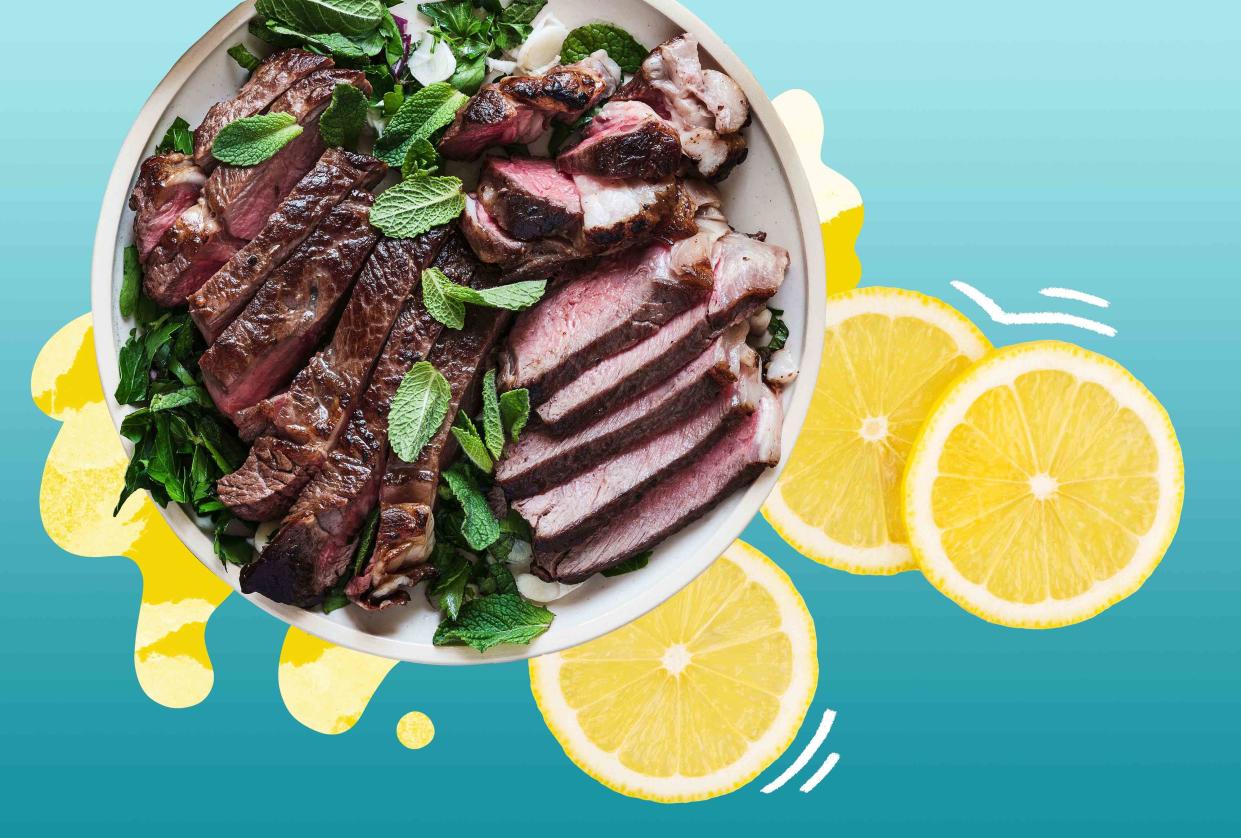Will Marinating Meat Before Grilling Really Reduce Carcinogens?

Fact checked by Nick Blackmer
Key Takeaways
Some research suggests that grilling meat on high temperatures can create carcinogens.
Marinating meat with antioxidant-rich spices could may help prevent these cancer-causing agents to form.
Other strategies include par-cooking meat to limit the time it spends on high heat or opting for vegetables.
Summer barbecue season is in full swing. The last thing you want to think about while firing up the grill is cancer risks, but cooking red meat at high heat can form cancer-causing agents known as carcinogens.
Studies are limited on the link between grilling and cancer risk, but meats cooked at high temperatures could produce two types of carcinogens—heterocyclic amines (HCAs) and polycyclic aromatic hydrocarbons (PAHs). HCAs are formed from a reaction between animal proteins and heat, while PAHs develop when meat fat drips, smokes, and sticks on the meat.
Research published in 2008 showed that marinating meat before grilling could reduce certain carcinogens by almost 90%, and this tip has recently resurfaced on social media.
The reaction that leads to forming HCAs only occurs on the first 3–4 mm of the surface of the meat, according to J. Scott Smith, PhD, chair of the food science graduate program at Kansas State University who conducted the research.
“Adding a surface marinade containing antioxidants can dramatically inhibit the reactions,” Smith told Verywell in an email.
Antioxidants protect cells from damage and they can be found in berries, citrus, and spices. Some researchers recommended marinating meat with lemon juice, basil, or mint before grilling. However, it’s not proven that a simple marinade can eliminate all cancer risk associated with grilling, according to Misagh Karimi, MD, a medical oncologist specializing in gastrointestinal cancers at City of Hope Orange County Lennar Foundation Cancer Center in Irvine, California.
How should you protect your health while enjoying your summer cookout plans then? We spoke to a few experts about how to grill meats safely.
Marinate Wisely
Even though brushing a marinade onto the meat won’t reduce all cancer risks, marinading it for 30 minutes before grilling may still reduce some risk of carcinogens from forming, according to Karimi.
“The question, still being investigated, is to what extent the antioxidant ingredients in marinade lower those harmful compounds and the level of risk reduction they might provide,” Karimi told Verywell in an email.
More research is needed to confirm this theory, but marinades made with herbs from the mint family, like rosemary, thyme, basil, and oregano, might be the best bet because these are rich in antioxidants.
He also said it’s best to add sauces at the end of cooking to reduce the chance of charring.
“When you char meat, poultry, and fish at high temperatures, the HCAs form. Those compounds can damage DNA in ways that increase the chances of cancer developing,” he said.
Veg Out
Another way to reduce carcinogen consumption is to plan a plant-based barbecue since vegetables don’t form HCAs when grilled.
Even if you don’t want to go fully vegetarian, grilling leaner cuts of meat or seafood can help, according to Bethany Doerfler, MS, RDN, a GI research specialist and clinical dietitian at the Digestive Health Center at the Northwestern University Feinberg School of Medicine.
“All animal protein is capable of producing these compounds. But poultry and fish, by nature, produce less of these carcinogenic compounds than beef, pork and lamb,” Doerfler told Verywell.
Cutting back on meat in general may also offer health benefits. Studies have shown that dietary patterns high in red and processed meats are associated with an increased risk of cancer, cardiovascular disease, and death.
Microwave First
Doerfler also recommends par-cooking meat in the microwave first so it won’t need to spend as much time on the grill.
“Any shortcut that is going to reduce the length of time that your meat is being cooked over intense high direct heat will help you,” she said.
Just make sure to move this meat to the grill right away as the U.S. Department of Agriculture warns that refrigerating par-cooked meat could cause bacteria to grow, which might lead to food poisoning.
If you want to skip the par-cooking step, you can also try to place the meat on foil or set the food on a higher rack to reduce its exposure to open flames, according to Doerfler.
“It’s possible to grill, but what you don’t want is direct face time with the charring flame on the meat,” she said.
Try a Lower Heat
Turning down the grill may also help, so plan on the meal taking a little longer to cook.
Research from 2015 suggested that reducing the pan temperature when cooking meat could lower the formation of HCAs. Although this finding was not directly related to grilling, it could mean that cooking meat at lower temperatures may reduce carcinogen development.
Flip It
Flipping meat frequently can also cut down on the charring and help keep carcinogens from forming according to Karimi.
There’s no set time to flip, but it’s best to keep an eye on the grill and turn the food a few times during the cooking process.
Although grilling meat may seem unhealthy, Researchers still don’t know how often you’d have to grill for the carcinogen consumption to be a concern.
“The bottom line is that cancer risk varies and reducing exposure to carcinogens is the best way to lower your risk of cancer. Do not grill every meal and when you do cook on the grill, eat less charred meat,” he said.
What This Means For You
There are ways to plan a safer and healthier summer barbecue. You can reduce the risk of carcinogens by marinating meat with an antioxidant-rich seasoning blend, par-cooking, or adding more plant-based options to your menu.

